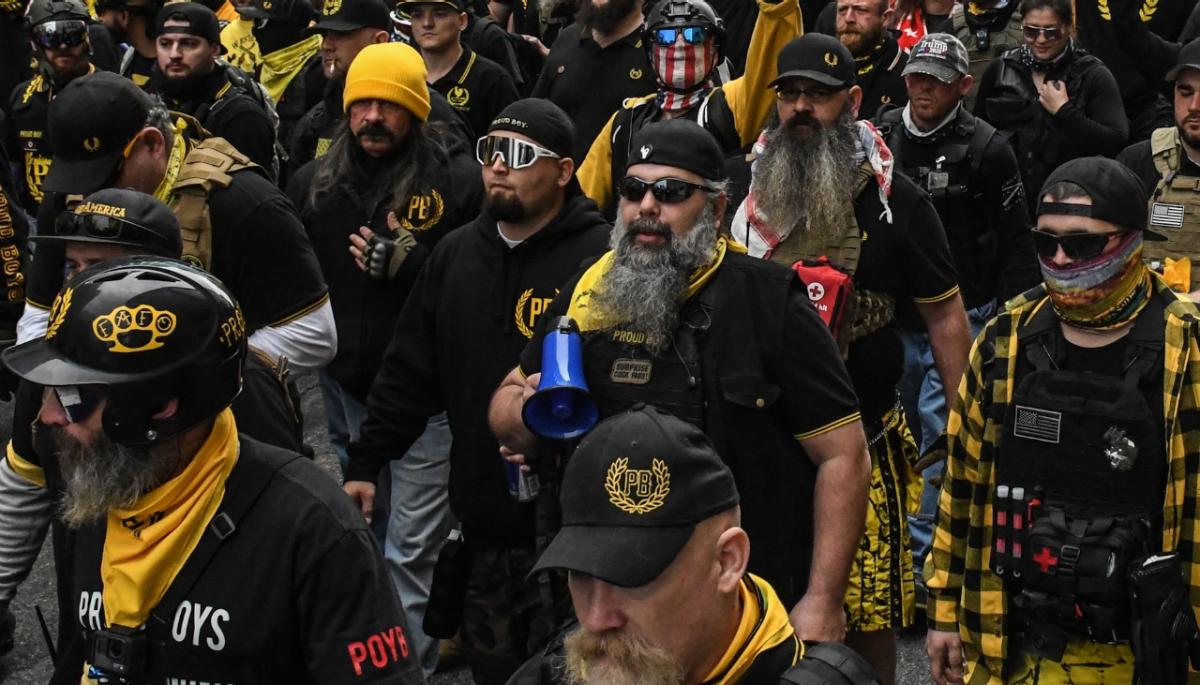
New Zealand has designated US groups the Proud Boys and The Base as terrorist entities.
Set down in the government's official journal of record - the gazette - last Monday, 20 June, it was published publicly a week later but with no wider dissemination.
The move - authorised by Police Commissioner Andrew Coster and signed off by Prime Minister Jacinda Ardern - makes anyone with property or financial dealings related to The Base and the Proud Boys liable for prosecution and up to seven years imprisonment under the Terrorism Suppression Act.
The American Proud Boys is a US neo-fascist group with members and leadership who have been federally indicted over the 6 January riots at the US Capitol.
The Base is a paramilitary white nationalist hate group active in the US and Canada, with reports of training cells in Europe, South Africa and Australia.
Coster said in practice it would mean funding, supporting, or organising with those groups in New Zealand became a criminal offence.
"Those groups are respectively neo-Nazi, neo-fascist, white supremacist groups who have been responsible for some key unlawful events overseas, and so police supported the designation," he said.
They met the definition of terrorist groups, he said, and the designation had gone through a rigorous analytical process with input from several agencies, which generally took several weeks.
"It's ultimately a matter for each jurisdiction to decide, but I would note that these groups have been designated in Australia and obviously they're one of our closest partners in assessing the terrorism threat."
He said such designations were not done lightly, but he was not aware of any suggestion it was a current problem domestically.
"It's a preventative, deterrent mechanism for those groups not to operate here."
Coster said the document setting out the evidence and reasoning behind the designation would be made public soon.
Researcher into the far-right Byron Clark said most other groups on the list were Islamic terrorist groups, and the designation showed New Zealand was taking far-right terrorism seriously.
"It's aligned I guess with what intelligence agencies are saying, that this is the biggest risk now is far-right terrorism - it's a higher likelihood of a far-right terrorist attack than an Islamic terrorist attack in the current climate."
It would likely mean those linked to the groups would be under more scrutiny from law enforcement and journalists, he said. With the Christchurch mosque attacker having come from Australia, there was still some complacency over the far-right in New Zealand.
"There are some small groups here who share a lot of the ideology of the Christchurch shooter and I think perhaps we're still not paying enough attention to those."
Te Pūnaha Matatini's The Disinformation Project researcher Sanjana Hattotuwa said anti-vaccination proponents were deeply sceptical of government, had moved on to other causes, and were more often coming in contact with far-right ideologies.
"So within that constellation that is informed by mis- and disinformation predominantly, what we find are belief systems, structures, attitudes and perceptions linked to white supremacist discourse and ideologies coming in and taking root here," he said.
"It's no longer something you can say are imported harms because there are people within the country who are producing and mirroring that kind of discourse as well."
He said the Disinformation Project had seen an increase in trans-national funding for ideological groups in Aotearoa, which the designation could capture.
"One would hope ... that the designation timing creates friction around the growth of these entities," he said.
Fight Against Conspiracy Theories (FACT) Aotearoa spokesperson Stephen Judd said it would also send a message to people considering setting up local branches or equivalents of those groups.
"There are legitimate concerns about groups along the lines of the Proud Boys or The Base forming and operating here ... you can see the same ideologies and some of the same conspiracy theories circulating online and in real life between people here."
He said the ease of online communication meant such groups could form, organise and recruit much more easily than ever before, and develop their ideas and messages more easily.
The designation automatically expires on 20 June 2025, unless extended or revoked.
RNZ


